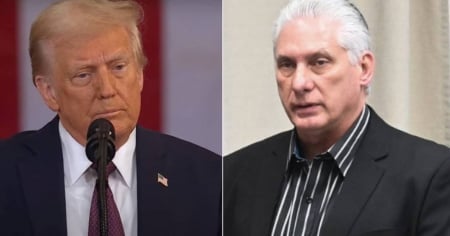In one of his first statements after assuming his second term as president of the United States, Donald Trump caused a stir by claiming that his country "does not need Latin America."
During a session with journalists at the decree signing ceremony in the Oval Office, the president expressed positions that seem to signal a drastic shift in relations with the region.
In response to a question posed by a Brazilian correspondent about the relationship between the United States, Latin America, and Brazil, Trump noted:
“Great. It should be great, because we don’t need them. They need us far more than we need them. We don’t need them. They need us. Everyone needs us,” he concluded, wrapping up his response.
His words have been poorly received by millions of Latin Americans both inside and outside the United States. Many have reminded the U.S. president of the significant role the Latino vote played in his return to power.
Initial measures and a confrontational tone
Trump's inauguration speech included a series of promises related to Latin America that he is already implementing through executive orders. Among them, the following stand out:
Rename the Gulf of Mexico as "Gulf of America":
A measure that drew immediate criticism from the president of Mexico, Claudia Sheinbaum, who stated that for her country and the rest of the world, "it remains the Gulf of Mexico."
Recover the Panama Canal:
Trump accused the Panamanian government of violating agreements regarding neutrality in the management of the canal. "We have been treated very poorly by this reckless gift," he said.
The president of Panama, José Raúl Mulino, categorically rejected the statements, asserting that "the canal is and will continue to be Panama's."
Tariffs on Mexico and Canada:
Trump confirmed that he plans to impose a 25% tariff on imports from these countries, which could severely impact the Mexican economy, as more than 80% of its exports are destined for the United States.
National emergency at the southern border:
With the mobilization of thousands of troops and the reinstatement of the controversial immigration policy "Remain in Mexico," the president strengthens his stance against irregular migration.
Reactions in Latin America
Trump's measures and statements have provoked strong reactions in the region.
The President of Mexico, Claudia Sheinbaum, called for "a cool head" and assured that her government will act in defense of sovereignty.
Regarding the designation of drug trafficking cartels as "terrorist groups," he warned that this could serve as a justification for a U.S. military intervention on Mexican soil.
"What we are going to seek is coordination in security matters with respect to our sovereignty," he emphasized.
Panama, in addition to rejecting the accusations regarding the Canal, brought the issue to the UN, requesting respect for the principles of territorial integrity and non-intervention.
The Cuban regime has also reacted with rejection to the island's inclusion once again in the list of countries that sponsor terrorism.
The President of Colombia, Gustavo Petro, described the isolationism proposed by Trump as "dangerous."
"Those who weaken are the ones who remain alone," he warned, emphasizing the importance of international cooperation in all areas.
Complicated phase in relations between the U.S. and Latin America.
Donald Trump's return to the White House marks the beginning of a complicated phase in the relations between the United States and Latin America.
Trump's policies regarding Latin America have raised concerns in various sectors.
Rafael Peñalver, a constitutional lawyer, suggested that the tone of the statements could be interpreted as "declarations of war."
With a more restrictive and confrontational foreign policy, the region faces the challenge of balancing negotiation and sovereignty in the face of a leader whose vision for Latin America seems to be more threatening than cooperative.
Frequently asked questions about Donald Trump's statements and their impact on Latin America
Why did Donald Trump assert that the United States "does not need Latin America"?
Donald Trump stated that the United States "does not need Latin America" because he believes that the countries in the region depend more on the United States than the other way around. This statement reflects a confrontational stance and a dramatic shift in the relationship with the region.
What measures has Trump taken regarding Latin America since his return to power?
Since his return to power, Donald Trump has taken several measures that affect Latin America, such as renaming the Gulf of Mexico, trying to reclaim the Panama Canal, and increasing tariffs on Mexico and Canada. These actions have generated tensions and negative reactions in the region.
How has Latin America reacted to Trump’s statements and measures?
Latin America has reacted with strong criticism to Trump’s statements and measures. Leaders such as the President of Mexico, Claudia Sheinbaum, and the President of Panama, José Raúl Mulino, have categorically rejected Trump’s actions, defending the sovereignty of their countries and bringing some issues to international bodies such as the UN.
What impact could Trump's policies have on relations with Latin America?
Trump's policies could lead to a deterioration in relations with Latin America, as his statements and measures have been perceived as threatening and dismissive towards the region. This could complicate international cooperation and increase diplomatic tensions.
Filed under:
